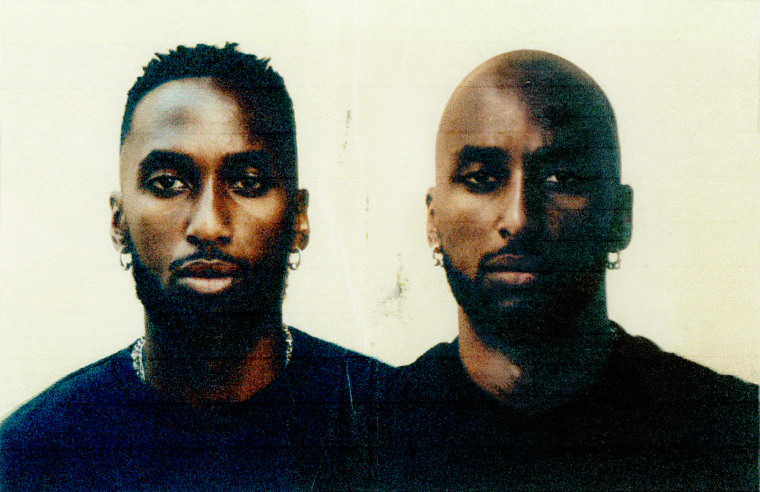Noah Agemo
A CD lies in a dumpster on a bed of discarded bottles and coffee cups; another leans against a light post, a third glints from a supermarket shelf. Scattered around Stockholm, Sweden, the discs are each scrawled with the name of a song, “Fun,” written in dark ink.
These jettisoned items are the work of Deki Alem, the enigmatic Swedish band of twin rappers Sammy and Johnny Bennett who have vowed to transcend the online world. Formed during the pandemic alongside seasoned producers Richard Zastenker and Johannes Klahr, they’ve fostered an explosive sound mixing relentless rave-infused beats with hazy synths and dark, spectral choruses. (Deki Alem, meaning “Alem’s Children,” is an homage to the twins’ mother and the Eritrean side of their heritage.) They’ve prioritized live shows over streaming and physical marketing over digital campaigns as they made waves in Stockholm’s underground.
“We want people to find us outside in the real world where people actually meet,” Johnny says over a recent Zoom. “It’s a more playful way for us to make a mark than just creating assets or content. That’s what artists have been confined to.”

Noah Agemo
The cryptic CDs placed around Stockholm are the brothers’ antithesis to Instagram reels and proof that the band remains committed to its mission that’s turning industry heads. The group’s 2022 debut EP Among Heads earned them a Swedish Grammy nomination and was quickly followed by their second project, the experimental and propulsive Fluent Stutter. Their latest effort is debut album, Forget In Mass, released August 8. With rebellious, ironic lyrics and production that whiplashes from orchestral to rap to car horn instrumentals, the eight tracks explore Deki Alem’s stance on today’s content on content mentality, an evisceration of the social media world.
“In the time we live in, it’s a lot of information just hitting us randomly. Being able to listen to this music to declutter ourselves and escape into another zone, that’s what the title [Forget In Mass] hints at,” Johnny says.
Ahead of a headlining European tour, Sammy and Johnny sat down with The FADER to talk about finding their sound, what makes a Deki Alem live show, and going against the modern content-driven world.
The FADER: What are you looking for in a song and how do you know when you’ve found something special that you want to chase?
Sammy: We like to joke around a lot in the studio. Everything isn’t that serious in the beginning, and then it tends to be very serious in the end. The spark comes from feeling like we’re creating something that we can have fun with, especially live, when we meet our audience. We always reflect on that: how would this sound live, rather than would this be a song that can stream a lot.
It seems like there’s more of an in-depth focus on a few songs rather than trying to make a large quantity and choose between them.
Sammy: We work on a song and know we’re gonna finish it. It’s not like we have 200 songs in the vault that we’re gonna release sometime. That’s why the album has eight tracks. Nowadays, people are so fixated about having this large catalog of random songs and filler, content on content and bullshit on bullshit. It’s a lot to take in. I’m happy that we worked on this project in a different way.

Noah Agemo
Your song “House Fire” seems to be about rebellion. What were you responding to when you wrote that?
Johnny: As a group, we always feel like we want to find our own path. Here in Sweden, it’s a very streamlined lifestyle that you adhere to very easily. The cycle of life is very similar for a lot of people, and this song comes a little bit from that, feeling oppressed in a way. If you contain too many people within a specific pattern for too long, there’s consequences to that. The song is an outburst and a call for freedom.
“Tip Of Your Tongue” is a critique of the loss of the individual to the online sphere. As artists, how do you navigate your own digital spaces?
Sammy: We don’t. I’m on social media because of the artistry and being able to market myself, but if it wasn’t for that, I don’t think I would be on there. It’s a lot to take in. Even just watching the telly or something today, subliminal messages are trying to hit you all the time and change the way you think and your goals and your ambitions. Not that I’m paranoid or something like that, but I’m just trying to keep my own peace.
Do either of you have a favorite lyric on the album that you’d like to illuminate for your audience?
Johnny: One that comes to mind that I like is “What’s a man without a purpose? Just a little muscle at another man’s service.” It’s from my verse on “Mr Man,” and encapsulates us in a way. We’re trying to find our own voice. That’s why we go so hard in the studio, finding our sounds, having fun with it, and not just focusing on the numbers. It’s more about having that expression coming out fully as we wanted it.
Sammy: I was about to come with a really goofy line, but he said something so serious, I don’t even want to follow up with mine. I would say, [from “Tip Of Your Tongue”], “If you’re a cunt and don’t know who to be, then pussy be that.”
You’ve both spanned the breadth of lyricism here.
Sammy: That’s the best thing with us as well. We can circle around some serious topics and have those discussions in the studio, but we also have a lot of one-liners and goofy songs that don’t even mean nothing, to be honest.
It’s a fine line working on these songs, trying to not be too playful and still connect with the subject. Also, we are Deki Alem and we’re twins on top of that. People always talk about us as one. People have been like, “But Johnny said that, so that must mean that Sammy thinks that too.” That’s the task of being two lyricists and trying to get one thought out of one song.
Johnny: Yeah, I actually just saw there’s a festival in Ohio that they hold every year where identical twins come to link up and meet. It would be super fun to play there one day.

Noah Agemo
What are the essential elements of a Deki Alem live performance?
Sammy: When I go to shows, if I see an artist on stage enjoying themselves and not thinking about, “I’m here performing” or “I’m super aware of my toes tonight,” I can relax myself and just be in that moment. When I’m dancing on stage, that’s no fucking thought-out dance step that I’m doing, I’m just trying to vibe and connect with myself. If I do that, I feel like it’s always gonna be a good show.
Johnny: Yeah, exactly, it’s about finding the authenticity in the performance. There’s obviously performative aspects going into a show. You have everything planned and the sequence and stuff like that, but when it comes down to it, you just have to be one with the song.
Sammy: It lets the audience connect with the feeling they had when they listened to the song for the first time, not being disrupted by an artist being self-absorbed or being up on stage trying to do something extra and shit like that.




